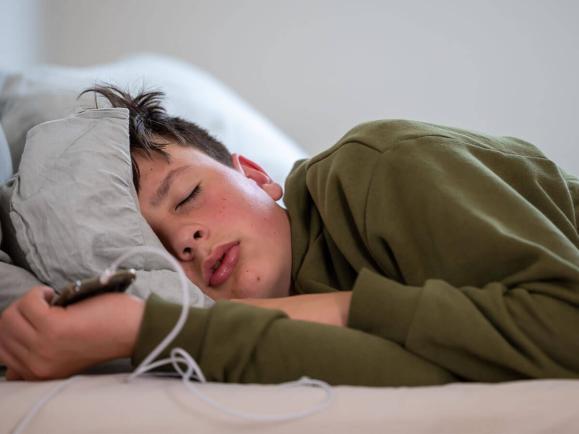
According to experts, teenagers should be getting between eight and ten hours of sleep a night, yet a vast majority of them are falling short. The 2024 Sleep in America Poll from the National Sleep Foundation (NSF), found that 80 percent of teenagers are not getting enough sleep, most of them scoring an "F" in terms of healthy sleep behaviors. The poll compiled sleep data from a variety of different indexes and questionnaires, as well as PHQ-9 (patient health questionnaire) to gauge teens' depressive episodes. Why are teens' depressive episodes being studied? Many teens reported that when they get insufficient sleep, their mental health suffers.
According to Dr. Joseph Dzierzewski, PhD, vice president of research and scientific affairs at NSF, teens are sleep-deprived for many reasons. They face many challenges each day that can effect their sleep patterns. "Those [challenges] include school schedules and demands, extracurricular activities, social commitments, employment responsibilities and the constant lure of electronic content, to name a few," he told Fox News. The poll found that school demands and activities are one of the biggest sleep blockers.
Dzierzewski noted that there is a two-way connection between sleep health and mental health. "Poor sleep health can lead to depressive symptoms, and depressive symptoms can lead to poor sleep health," he said. The poll found that teens who don't get the recommended amount of sleep on school nights, have higher levels of depressive symptoms. Dr. Zaid Fadul, the Arizona-based medical director at Better U, an online mental health provider, shared his observations of the "clear connection" between sleep health and mental health in teenagers. It's deeply concerning that such a significant portion of teens are not getting the sleep they need, which undoubtedly impacts their academic performance, emotional health and overall quality of life," said Fadul.
How can teens improve their sleep? Dzierzewski gave a few helpful tips. During the day, teens should get at least some bright light, especially in the morning. They should also exercise regularly and eat consistent meals. Teens should prioritize sleep and should have a consistent, relaxing wind-down routine in order to maintain a regular sleep schedule. Fadul noted that families, schools and communities all play a part in supporting the sleep of young people. "In my view, parents must be proactive in creating environments conducive to good sleep and in establishing routines that encourage healthier sleep habits, such as reducing screen time before bed," he said. "Moreover, I firmly believe that schools and community programs must align to promote better sleep practices among teenagers, potentially revisiting policies like school start times to better accommodate teens' biological clocks." He concluded, "As both a clinician and a parent, I see the urgent need to rethink our approach to teen sleep health, ensuring that it's treated as the foundational aspect of mental well-being that it truly is."

